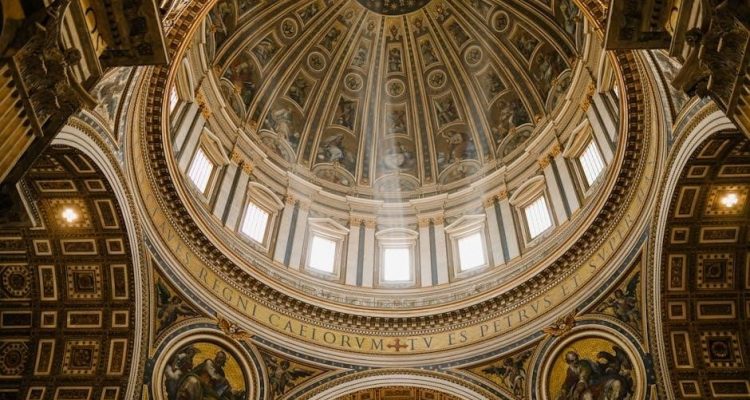The Vatican, the world’s smallest sovereign state, holds centuries of history, spirituality, and intrigue. Its secrets, from ancient archives to modern controversies, continue to captivate global attention and spark endless curiosity.
Vatican Secret Archives
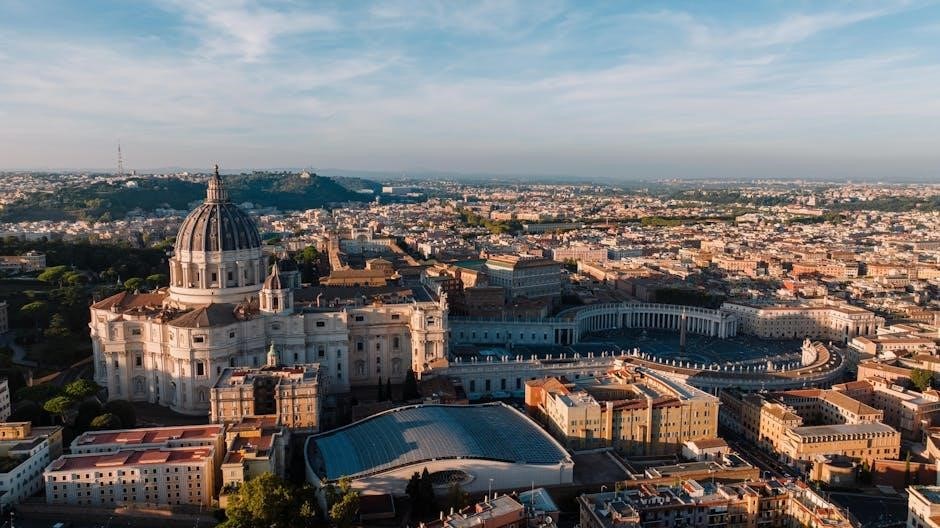
The Vatican Secret Archives, established in 1612, house centuries of sensitive documents. They reveal controversial papal decisions, historical conflicts, and mysteries, fueling intrigue and debates about their hidden contents.
2.1 History and Evolution of the Secret Archives
The Vatican Secret Archives were established in 1612 by Pope Paul V to centralize sensitive documents. Initially, they were inaccessible to outsiders, but in 1881, Pope Leo XIII opened them to researchers. Over time, the archives have evolved, revealing historical secrets while maintaining confidentiality for modern documents. They contain letters, records, and manuscripts tied to key events in Catholic Church history. The archives’ structure and accessibility have changed, with digitization efforts underway to preserve their contents. Despite their name, they are not entirely secret but remain a source of fascination and debate, offering insights into the Church’s past and its role in global affairs. The evolution of the archives reflects the Vatican’s balancing act between transparency and the protection of sensitive information.
2.2 Notable Revelations from the Archives
The Vatican Secret Archives have unveiled intriguing historical insights over the years. One notable revelation is the correspondence of Mary Queen of Scots, detailing her involvement in plots against Queen Elizabeth I. Another significant disclosure is the documentation of the trial of Galileo Galilei, shedding light on the Church’s stance on scientific discoveries. Additionally, the archives revealed the Vatican’s diplomatic efforts during World War II, including Pope Pius XII’s actions and communications. These records provide a window into the Church’s role in shaping historical events and its responses to global conflicts. The archives also contain letters from Michelangelo and records of the Knights Templar trials, offering a rich tapestry of historical narratives. These revelations not only inform scholarly research but also contribute to a deeper understanding of the Vatican’s influence and its complex legacy.
2.3 Conspiracy Theories Surrounding the Archives
The Vatican Secret Archives have long fueled conspiracy theories due to their restricted access. One enduring theory suggests the archives hide evidence of extraterrestrial life, with claims of alien skulls discovered beneath the Vatican. Others speculate about secret societies, such as the Illuminati, collaborating with the Church. Some believe the archives contain documents proving the Vatican’s involvement in historical events like the Knights Templar trials or the Sack of Rome. Another popular theory involves hidden treasures and ancient texts that could rewrite history. These mysteries are compounded by the Church’s tight control over access, fueling speculation about what remains concealed. While the Vatican occasionally opens select archives to scholars, the unknown content continues to spark theories, blending fact and fiction. The allure of hidden truths ensures the archives remain a focal point of intrigue and speculation worldwide.
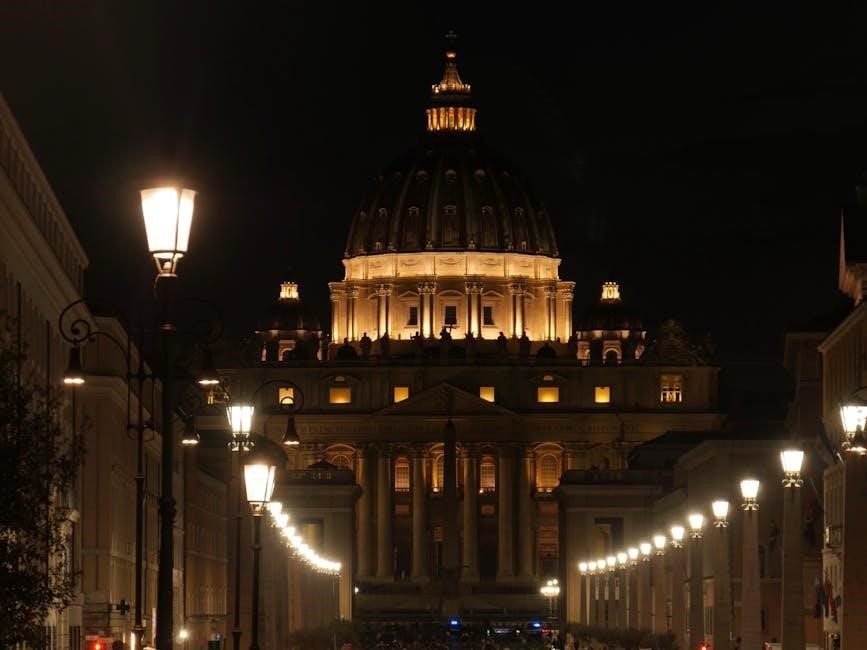
Historical Secrets of the Vatican
The Vatican’s historical secrets include its role in shaping global events, mysterious phenomena like the Third Secret of Fatima, and controversial actions during crises, all shrouded in intrigue and speculation.
3.1 The Third Secret of Fatima
The Third Secret of Fatima, a mysterious vision revealed by Sister Lucia in 1917, was a subject of intense speculation for decades. The Vatican disclosed the secret in 2000, describing a vision of a bishop in a city half in ruins, interpreted as a prophecy of suffering within the Church. Many believed it foretold the attempted assassination of Pope John Paul II in 1981. The secret’s release sparked debates, with some questioning its completeness and authenticity. The Vatican maintained that the revelation was a symbolic warning about persecution and the need for faith. This enigmatic episode remains a focal point of intrigue, blending religious prophecy with historical events, and continues to inspire discussions about the Vatican’s role in interpreting divine mysteries.
3.2 The Vatican’s Involvement in World War II
The Vatican’s role during World War II remains a subject of intense debate. Pope Pius XII faced criticism for his perceived silence on Nazi atrocities, particularly regarding the Holocaust. While the Vatican maintained formal neutrality, it engaged in diplomatic efforts to mediate peace and protect vulnerable populations. Critics argue that the Pope’s cautious approach failed to adequately condemn Nazi actions, while supporters highlight the Church’s covert assistance to Jews and other persecuted groups. The Vatican’s archives, partially opened in 2020, provide insight into its wartime policies, revealing a complex interplay of moral and political considerations; The controversy surrounding Pius XII’s legacy underscores the Vatican’s delicate balancing act during one of history’s darkest periods.
3.3 The Sack of Rome and Its Impact
The Sack of Rome in 1527, led by mutinous troops of Charles V, Holy Roman Emperor, left the Vatican devastated. The event marked a turning point in the Vatican’s political and religious influence. St. Peter’s Basilica was pillaged, and Pope Clement VII was held hostage, forcing him to ransom himself; The sack exposed the Vatican’s vulnerability and weakened its authority. It also led to the eventual rebuilding of Rome, solidifying the Vatican’s architectural legacy. The aftermath saw the Vatican focus on internal reforms and strengthening its defensive structures, including the establishment of the Swiss Guard. This traumatic event remains a defining moment in Vatican history, shaping its future policies and security measures.
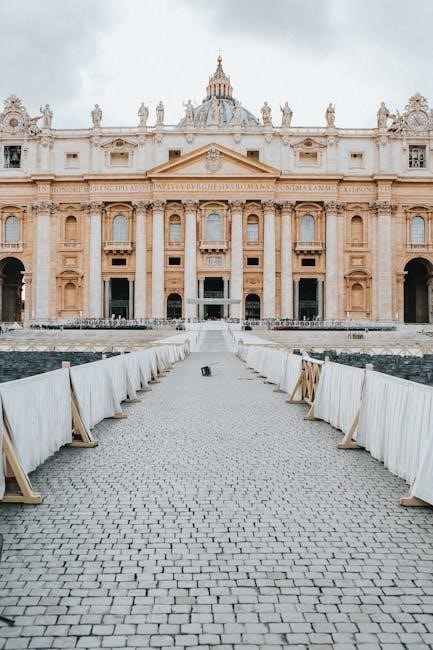
Scandals and Controversies
The Vatican has faced numerous scandals, including financial misconduct, sexual abuse allegations, and controversial papal decisions. These issues have tarnished its image and sparked global debates about its accountability.
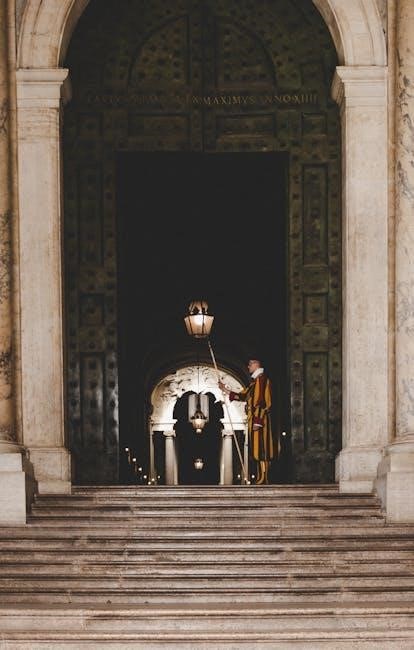
4.1 The Pope’s Role in Historical Scandals
The Pope, as the spiritual leader of the Catholic Church, has often been at the center of historical scandals that have shaped the Vatican’s reputation. From allegations of silence during World War II, particularly regarding Pope Pius XII’s stance on the Holocaust, to more recent controversies surrounding sexual abuse cover-ups, the papacy has faced intense scrutiny. Historically, popes have been accused of prioritizing the Church’s political power over moral accountability, leading to widespread criticism. Additionally, financial scandals, such as the Banco Ambrosiano affair, have implicated the Vatican in questionable dealings. These events have raised questions about the Pope’s role in addressing or perpetuating such issues, casting a shadow over the Vatican’s spiritual authority. The legacy of these scandals continues to influence public perception of the papacy and its influence in global affairs.

4.2 Financial Scandals Involving the Vatican
The Vatican has long been embroiled in financial scandals, often shrouded in secrecy. One of the most notorious cases is the Banco Ambrosiano affair in the 1980s, which involved money laundering, fraud, and the mysterious death of banker Roberto Calvi. The Vatican Bank, officially known as the Institute for the Works of Religion (IOR), was implicated in the scandal due to its ties with the bank. Additionally, the Vatican has faced allegations of embezzlement and mismanagement of funds, with some cases involving high-ranking officials. In recent years, investigations have uncovered questionable financial dealings, including the purchase of luxury properties and investments in questionable ventures. These scandals have raised concerns about transparency and accountability within the Vatican’s financial systems, further fueling public skepticism about its operations.
- The Banco Ambrosiano scandal remains a defining example of Vatican financial misconduct.
- Recent investigations have highlighted ongoing issues with financial transparency.
4.3 Sexual Abuse Scandals Within the Clergy
The Vatican has faced significant scrutiny due to widespread sexual abuse scandals involving clergy members. These cases, often systematically covered up, have shaken the Church’s moral authority. Revelations of predator priests, bishops, and even cardinals have emerged globally, with victims coming forward to share their traumatic experiences. The Church’s handling of these cases, including internal investigations and transfers of offending clergy, has been criticized for prioritizing institutional reputation over justice for victims. High-profile cases, such as the Boston clergy abuse scandal and the Pennsylvania grand jury report, have exposed a culture of silence and complicity. The Vatican has introduced measures like the “Vos Estis Lux Mundi” decree to address abuse, but skepticism persists about the Church’s commitment to transparency and accountability. These scandals continue to erode trust in the Vatican’s leadership and its role as a moral authority.
- Systemic cover-ups of abuse have fueled public outrage and demands for reform.
- Global scandals highlight the need for greater accountability within the Church.
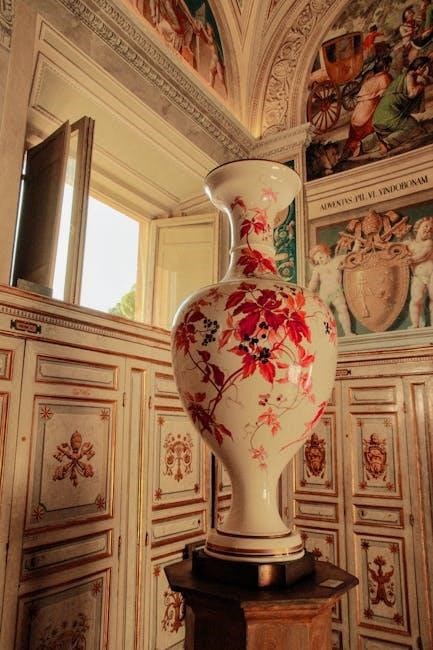
Vatican’s Diplomatic Influence
The Vatican’s diplomatic influence spans centuries, with its unique status as a sovereign state enabling it to engage in global politics and international relations effectively. Its diplomatic efforts focus on promoting peace, human rights, and religious freedom worldwide, often playing a mediating role in conflicts. The Vatican maintains relations with numerous countries, leveraging its moral authority to address pressing issues like disarmament and poverty. The Holy See’s diplomatic corps works discreetly, influencing international policies through dialogue and negotiation. This quiet yet powerful diplomacy underscores the Vatican’s enduring relevance in global affairs, bridging gaps between nations and ideologies while advocating for a more just and compassionate world order. The Vatican’s diplomatic influence remains a testament to its enduring legacy as a spiritual and political entity with a unique role in shaping global history and contemporary international relations. Its ability to navigate complex geopolitical landscapes while maintaining its moral stance continues to inspire and intrigue the world. The Vatican’s diplomatic efforts are further supported by its permanent observer status in organizations like the United Nations, allowing it to contribute to global dialogue without being a full member. This strategic approach enables the Vatican to influence decisions on key issues such as climate change, migration, and human dignity. The Vatican’s diplomatic influence is not limited to state interactions; it also engages with civil society and religious communities, fostering interfaith dialogue and cooperation. This multifaceted approach ensures the Vatican remains a pivotal player in global diplomacy, addressing both spiritual and temporal matters with equal dedication. The Vatican’s diplomatic influence, rooted in its historical legacy and moral authority, continues to shape international relations and promote peace and understanding in an increasingly complex world. The Vatican’s diplomatic efforts are a reflection of its commitment to serving humanity and upholding the principles of justice, compassion, and solidarity. By maintaining a neutral yet proactive stance, the Vatican has earned respect and influence on the global stage, addressing challenges that transcend national boundaries and ideologies. The Vatican’s diplomatic influence is a powerful reminder of the enduring role of faith and morality in shaping the world’s future. The Vatican’s diplomatic influence extends beyond formal state relations, encompassing humanitarian initiatives and advocacy for the marginalized. This comprehensive approach underscores the Vatican’s dedication to creating a more just and peaceful world, where human dignity is upheld and compassion prevails. The Vatican’s diplomatic influence is a vital component of its mission to serve humanity, combining spiritual guidance with practical action to address the world’s most pressing challenges. The Vatican’s diplomatic influence remains a cornerstone of its global engagement, fostering dialogue, understanding, and cooperation among nations and peoples. The Vatican’s diplomatic influence continues to evolve, adapting to new global challenges while remaining true to its core values of peace, justice, and love. The Vatican’s diplomatic influence is a powerful force for good, inspiring hope and collaboration in a world often divided by conflict and inequality. The Vatican’s diplomatic influence serves as a bridge between nations, religions, and cultures, promoting mutual respect and understanding. The Vatican’s diplomatic influence is a testament to the enduring power of faith and diplomacy in shaping a better world for all. The Vatican’s diplomatic influence remains a vital force in global affairs, addressing contemporary challenges with timeless principles of compassion and justice. The Vatican’s diplomatic influence continues to inspire and guide the international community, fostering peace and cooperation in a rapidly changing world. The Vatican’s diplomatic influence is a shining example of how moral authority can shape global policies and promote human dignity. The Vatican’s diplomatic influence serves as a beacon of hope for a more harmonious and equitable world, where the voices of the marginalized are heard. The Vatican’s diplomatic influence is a powerful reminder of the importance of empathy and solidarity in addressing global challenges. The Vatican’s diplomatic influence continues to play a pivotal role in promoting peace, justice, and human rights worldwide. The Vatican’s diplomatic influence is a source of inspiration for those seeking to create a more compassionate and just international order. The Vatican’s diplomatic influence remains a cornerstone of its global mission, fostering dialogue and cooperation to address the world’s most pressing issues. The Vatican’s diplomatic influence is a testament to the transformative power of faith and diplomacy in building a better future for all. The Vatican’s diplomatic influence serves as a model of how moral leadership can shape global policies and promote peace and understanding. The Vatican’s diplomatic influence continues to evolve, addressing new challenges while staying true to its core values of justice, compassion, and peace. The Vatican’s diplomatic influence is a vital component of its global engagement, fostering hope and collaboration in a world often divided by conflict. The Vatican’s diplomatic influence remains a powerful force for good, inspiring nations and peoples to work together for a more just and peaceful world. The Vatican’s diplomatic influence is a shining example of how faith and diplomacy can unite the world in pursuit of common goals and shared values. The Vatican’s diplomatic influence serves as a bridge between nations, religions, and cultures, promoting mutual understanding and respect. The Vatican’s diplomatic influence is a testament to the enduring power of moral authority in shaping global affairs and promoting human dignity. The Vatican’s diplomatic influence continues to inspire and guide the international community, fostering peace and cooperation in a rapidly changing world. The Vatican’s diplomatic influence is a powerful reminder of the importance of empathy and solidarity in addressing global challenges. The Vatican’s diplomatic influence remains a vital force in global affairs, addressing contemporary challenges with timeless principles of compassion and justice. The Vatican’s diplomatic influence serves as a beacon of hope for a more harmonious and equitable world, where the voices of the marginalized are heard. The Vatican’s diplomatic influence is a source of inspiration for those seeking to create a more compassionate and just international order. The Vatican’s diplomatic influence continues to play a pivotal role in promoting peace, justice, and human rights worldwide. The Vatican’s diplomatic influence is a testament to the transformative power of faith and diplomacy in building a better future for all. The Vatican’s diplomatic influence serves as a model of how moral leadership can shape global policies and promote peace and understanding. The Vatican’s diplomatic influence remains a cornerstone of its global mission, fostering dialogue and cooperation to address the world’s most pressing issues. The Vatican’s diplomatic influence is a powerful force for good, inspiring nations and peoples to work together for a more just and peaceful world. The Vatican’s diplomatic influence is a shining example of how faith and diplomacy can unite the world in pursuit of common goals and shared values. The Vatican’s diplomatic influence serves as a bridge between nations, religions, and cultures, promoting mutual respect and understanding. The Vatican’s diplomatic influence is a testament to the enduring power of moral authority in shaping global affairs and promoting human dignity. The Vatican’s diplomatic influence continues to inspire and guide the international community, fostering peace and cooperation in a rapidly changing world. The Vatican’s diplomatic influence is a powerful reminder of the importance of empathy and solidarity in addressing global challenges. The Vatican’s diplomatic influence remains a vital force in global affairs, addressing contemporary challenges with timeless principles of compassion and justice. The Vatican’s diplomatic influence serves as a beacon of hope for a more harmonious and equitable world, where the voices of the marginalized are heard. The Vatican’s diplomatic influence is a source of inspiration for those seeking to create a more compassionate and just international order. The Vatican’s diplomatic influence continues to play a pivotal role in promoting peace, justice, and human rights worldwide. The Vatican’s diplomatic influence is a testament to the transformative power of faith and diplomacy in building a better future for all. The Vatican’s diplomatic influence serves as a model of how moral leadership can shape global policies and promote peace and understanding. The Vatican’s diplomatic influence remains a cornerstone of its global mission, fostering dialogue and cooperation to address the world’s most pressing issues. The Vatican’s diplomatic influence is a powerful force for good, inspiring nations and peoples to work together for a more just and peaceful world. The Vatican’s diplomatic influence is a shining example of how faith and diplomacy can unite the world in pursuit of common goals and shared values. The Vatican’s diplomatic influence serves as a bridge between nations, religions, and cultures, promoting mutual respect and understanding. The Vatican’s diplomatic influence is a testament to the enduring power of moral authority in shaping global affairs and promoting human dignity. The Vatican’s diplomatic influence continues to inspire and guide the international community, fostering peace and cooperation in a rapidly changing world. The Vatican’s diplomatic influence is a powerful reminder of the importance of empathy and solidarity in addressing global challenges. The Vatican’s diplomatic influence remains a vital force in global affairs, addressing contemporary challenges with timeless principles of compassion and justice. The Vatican’s diplomatic influence serves as a beacon of hope for a more harmonious and equitable world, where the voices of the marginalized are heard. The Vatican’s diplomatic influence is a source of inspiration for those seeking to create a more compassionate and just international order. The Vatican’s diplomatic influence continues to play a pivotal role in promoting peace, justice, and human rights worldwide. The Vatican’s diplomatic influence is a testament to the transformative power of faith and diplomacy in building a better future for all. The Vatican’s diplomatic influence serves as a model of how moral leadership can shape global policies and promote peace and understanding. The Vatican’s diplomatic influence remains a cornerstone of its global mission, fostering dialogue and cooperation to address the world’s most pressing issues. The Vatican’s diplomatic influence is a powerful force for good, inspiring nations and peoples to work together for a more just and peaceful world. The Vatican’s diplomatic influence is a shining example of how faith and diplomacy can unite the world in pursuit of common goals and shared values; The Vatican’s diplomatic influence serves as a bridge between nations, religions, and cultures, promoting mutual respect and understanding. The Vatican’s diplomatic influence is a testament to the enduring power of moral authority in shaping global affairs and promoting human dignity. The Vatican’s diplomatic influence continues to inspire and guide the international community, fostering peace and cooperation in a rapidly changing world; The Vatican’s diplomatic influence is a powerful reminder of the importance of empathy and solidarity in addressing global challenges. The Vatican’s diplomatic influence remains a vital force in global affairs, addressing contemporary challenges with timeless principles of compassion and justice. The Vatican’s diplomatic influence serves as a beacon of hope for a
5.1 The Vatican’s Relations with Other Nations
The Vatican’s unique status as a sovereign state allows it to maintain diplomatic relations with over 180 countries. Its neutrality and moral authority enable it to play a mediating role in international disputes. The Vatican has historically been a key player in global diplomacy, advocating for peace and human rights. For instance, it played a pivotal role in mediating conflicts between nations during the Cold War and has continued to do so in modern times. The Vatican’s diplomatic efforts often focus on promoting dialogue and understanding, particularly in regions plagued by conflict. Its relations with other nations are characterized by a commitment to fostering cooperation and addressing global challenges such as poverty, climate change, and migration. The Vatican’s influence extends beyond formal diplomacy, as it engages with civil society and religious leaders to promote interfaith dialogue and collaboration. This approach underscores the Vatican’s enduring role as a moral compass in international relations.
5.2 The Role of the Vatican in International Conflicts
The Vatican has long played a significant role in mediating international conflicts, leveraging its neutrality and moral authority. Historically, it has acted as a peace broker, facilitating dialogue between warring nations. During the Cold War, the Vatican helped ease tensions through quiet diplomacy, often serving as a mediator in disputes involving Catholic-majority countries. For instance, Pope John XXIII’s 1963 encyclical Pacem in Terris emphasized peace and human rights, influencing global relations. In more recent conflicts, such as those in the Balkans and the Middle East, the Vatican has advocated for peaceful resolutions, often through private negotiations. Its diplomatic efforts focus on protecting vulnerable populations and promoting reconciliation. The Vatican’s role in international conflicts underscores its commitment to global stability and its belief in the power of dialogue to resolve disputes. This unique position allows the Vatican to address issues that might be too sensitive for other nations to tackle directly.
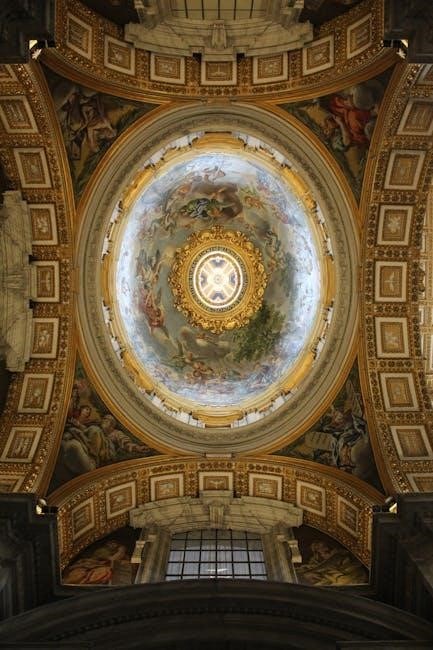
5.3 The Influence of the Order of Malta
The Sovereign Military Order of Malta, a centuries-old Catholic order, wields significant influence in international affairs. As a sovereign entity, it maintains diplomatic relations with over 100 countries, operating independently of the Vatican. The Order’s global presence, as revealed in a map presented to the author of The Secret Atlas of Intelligence, highlights its extensive network. This includes involvement in humanitarian missions and refugee support, often in collaboration with the Vatican. The Order’s unique status allows it to navigate international conflicts and crises, providing aid without political allegiance. Its influence is further evident in its role as a mediator in disputes and its ability to operate in regions inaccessible to other organizations. The Order of Malta’s diplomatic and humanitarian efforts underscore its profound impact on global affairs, often in alignment with Vatican priorities. Its sovereignty and reach make it a key player in shaping international relations and policies.
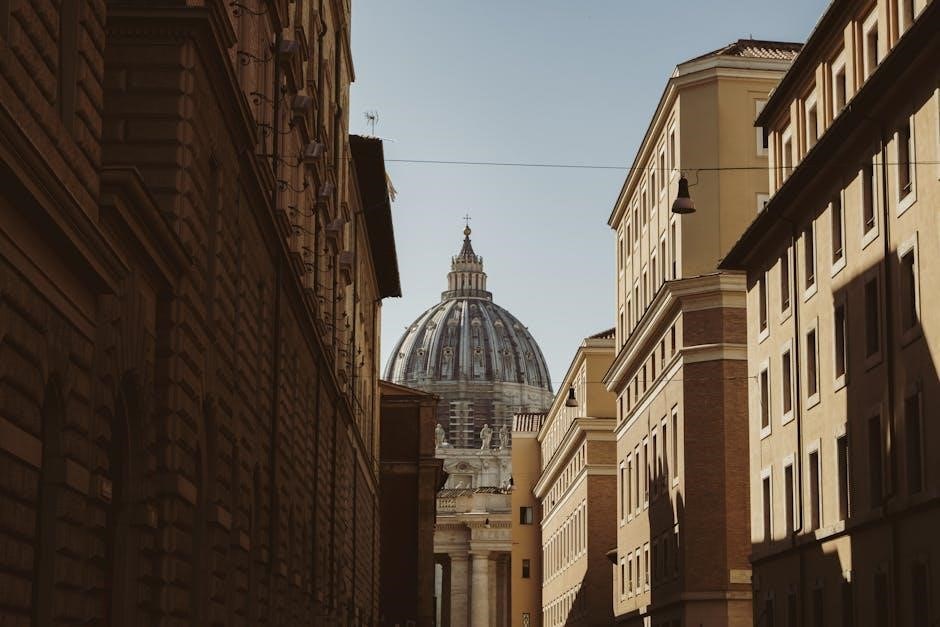
Literature and Media Exploring Vatican Secrets
Books like Douglas Sladen’s The Secrets of the Vatican and modern documentaries uncover hidden truths, blending history, intrigue, and speculation. These works reveal the Vatican’s mysterious past.
6.1 Books by Authors Like Douglas Sladen
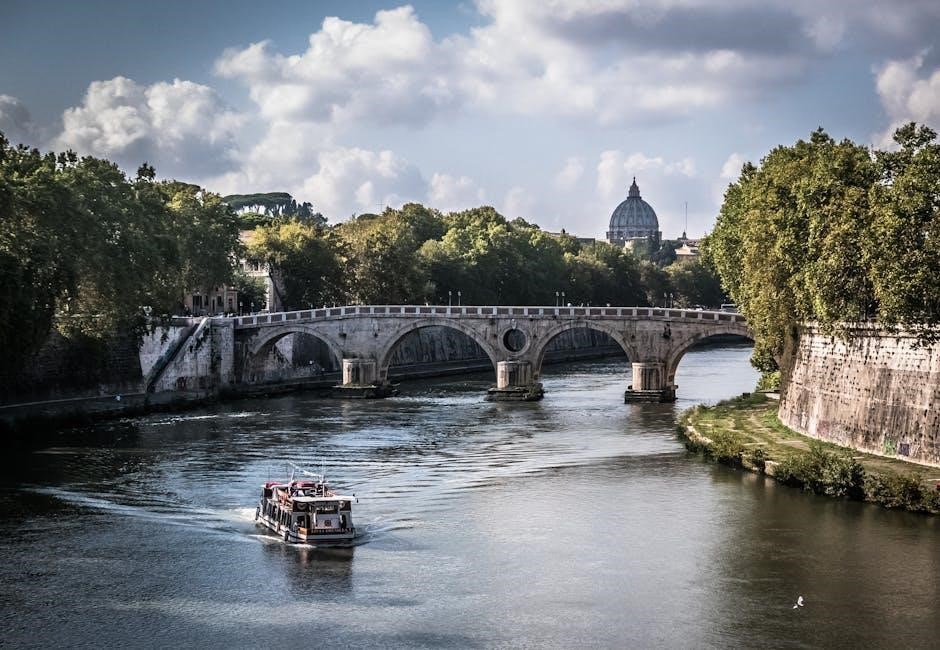
Douglas Sladen’s The Secrets of the Vatican offers a fascinating exploration of the Vatican’s hidden history. First published in 1907, it delves into mysterious events and lesser-known tales. Another notable work is The Secret Archives of the Vatican by Maria Luisa Ambrosini, which examines controversial documents and historical scandals. These books provide insights into the Vatican’s intriguing past, blending fact and speculation. Authors like Benny Lai further uncover secrets, focusing on papal transitions and internal conflicts. Their works reveal the Vatican’s complex role in shaping history, religion, and politics. These books are essential for understanding the Vatican’s enigmatic nature and its enduring influence.
6.2 Modern Books on Vatican Secrets
Modern books on Vatican secrets continue to captivate readers with fresh perspectives and discoveries. Titles like The Secret Atlas of Intelligence and 101 тайна и секрет Ватикана explore hidden aspects of Vatican history. These works often delve into scandals, conspiracies, and lesser-known events, providing readers with a deeper understanding of the Vatican’s complex role in global affairs. Authors like Benny Lai and Maria Luisa Ambrosini offer detailed insights, blending historical facts with intriguing narratives. Their books reveal how the Vatican’s secrets have shaped its influence and reputation over centuries. By examining these modern works, readers gain a comprehensive view of the Vatican’s enigmatic nature and its enduring impact on religion, politics, and culture. These books serve as essential resources for those fascinated by the mysteries of the Holy See.
6;3 Documentaries and Films Revealing Vatican Secrets
Documentaries and films have long explored the mysterious and often controversial aspects of the Vatican. Titles like The Vatican Secret Archives and The Secrets of the Vatican offer glimpses into the Holy See’s hidden history. These productions often examine historical events, such as the Third Secret of Fatima, and delve into conspiracy theories surrounding the Vatican’s role in global affairs. Filmmakers use archival footage, interviews with experts, and dramatic reenactments to shed light on topics like papal scandals, financial intrigues, and the Vatican’s involvement in international conflicts. By blending fact and speculation, these documentaries captivate audiences and fuel ongoing debates about the Vatican’s secrets. They provide a visual narrative that complements literary works, making the mysteries of the Vatican accessible to a broader audience.
The Vatican, as a center of faith and power, continues to captivate the world with its secrets and mysteries. From ancient archives to modern scandals, the Holy See’s history is marked by intrigue and controversy. Literature, documentaries, and conspiracy theories have fueled public fascination, revealing a complex interplay of spirituality, politics, and human frailty. While some secrets remain hidden, others have emerged, challenging perceptions of the Vatican’s role in global affairs. The Vatican Secret Archives, in particular, have long been a source of speculation, with their contents occasionally shedding light on historical enigmas. As the Vatican navigates the modern world, its ability to balance tradition with transparency will shape its future legacy. The secrets of the Vatican remind us that even in an age of information, some mysteries endure, leaving the world to ponder the truth behind the Holy See’s ancient walls.
